STATEHOUSE REPORT | ISSUE 23.49 | Dec. 6, 2024
BIG STORY: Clock already ticking for 2026 S.C. candidates
MORE NEWS: Future is bright for S.C. solar power, report finds
LOWCOUNTRY, Ariail: Making a fuss
BRACK: The state program lots of people love
SPOTLIGHT: The Felkel Group
MY TURN, E. Brack: Australia is tackling a major social problem
MYSTERY PHOTO: Home on the range
FEEDBACK: Statehouse agenda missing a couple of things
Clock already ticking for 2026 S.C. candidates

By Jack O’Toole, Capitol bureau | Two things happened simultaneously for South Carolina campaign professionals at 7 p.m. on Nov. 5. First, polls closed in the 2024 elections. And second, a relentless countdown clock started ticking down the minutes until polls will close again in a new set of statewide races on Nov. 3, 2026.
In a series of interviews this week, political and party leaders across the Palmetto State made it clear they were already finished celebrating or lamenting this year’s returns and now focused on the task ahead.
“It was a good election day with a lot to be happy about,” S.C. GOP Chairman Drew McKissick said of the party’s historic victories last month before turning to the future. “But the election showed more vulnerabilities for Democrats around the state that we’ll be coming back for in 2026.”
With GOP supermajorities in both houses of the state legislature and a Republican lock on statewide elected offices stretching back to 2010, McKissick said this year’s results showed the party still has room to grow at the local level.
“We picked up four sheriff’s seats, a probate judge, four clerks of court, three county coroners, one auditor, one solicitor, three county treasurers and 13 county council seats,” McKissick said. “In rural counties around the state, places where Republicans have never won before, we’re winning and have Democrats switching parties. … We’re looking at the opportunities we have to expand our coalition in those counties and districts.”
But Charleston County Democratic Party Chairman Sam Skardon argues that local Democrats have recent history on their side heading into 2026.
“Expect the [incoming] Trump administration to be extremely, unpopularly conservative just like it was in 2018, which was our best election cycle in a decade and a half,” Skardon told the City Paper on Dec. 2. “2026 has the potential to be the exact same dynamic.”
What’s more, he said, the lack of a presidential election at the top of the ticket will help local Democrats separate themselves from the larger pack of candidates.
“In midterms, with no presidential race dominating the narrative, we see a lot more variance between each individual race based on candidate quality, voter outreach, volunteer operations and fundraising,” Skardon said. “All those things just matter more in a non-presidential year.”
But even with increasingly intense party competition at the local level, most eyes remain fixed on 2026’s biggest prizes: a wide-open governor’s race to replace term-limited Gov. Henry McMaster as well as a possible GOP challenge to Republican U.S. Senator Lindsey Graham and a slew of likely open constitutional offices, including state treasurer, comptroller general and attorney general.
Republican names to watch in 2026
![]() With unchallenged power at the state level for the better part of a generation, Republicans say they have strong candidates ready to run for every open seat. Here are some of the names they mentioned most often in background conversations with the City Paper.
With unchallenged power at the state level for the better part of a generation, Republicans say they have strong candidates ready to run for every open seat. Here are some of the names they mentioned most often in background conversations with the City Paper.
Lt. Gov. Pamela Evette: A political newcomer when McMaster selected her as his running mate in 2019, the former business executive from Travelers Rest is seen as a likely, but longshot, candidate for governor.
U.S. Rep. Nancy Mace: Observers agree the fiery 1st District congresswoman will run statewide in 2026 but they’re not sure for which office — with some suggesting her eyes are on the governor’s mansion, and others saying that Graham’s Senate seat would be a better fit for her national aspirations.
Adam Morgan: After losing earlier this year in his primary challenge to 4th District U.S. Rep. William Timmons, the former S.C. House member and Freedom Caucus chair is seen as a possible contender in several statewide contests, including governor and attorney general.
U.S. Sen. Tim Scott: Though once considered a serious potential candidate for governor, most believe the popular North Charleston native took himself out of the race when he sought and won chairmanship of the National Republican Senatorial Committee in November.
U.S. Rep. Ralph Norman: Representing the Upstate’s 5th District since 2017, the wealthy real-estate developer who’s perhaps best known for demanding the imposition of “marshall” law in the wake of the 2020 presidential election is said to be eying a run for governor.
S.C. Attorney General Alan Wilson: Currently in his fourth term as the state’s top lawyer, the former Lexington assistant solicitor and military veteran is said to be a virtual certainty in the governor’s race — and the probable front-runner on the day he announces.
And on the Democratic side
![]() With Republicans riding high, Democrats acknowledge candidate recruitment will be their greatest challenge in 2026. Nevertheless — and in some cases, they admit, with as much hope as certainty — sources close to the party say the following names belong in the conversation.
With Republicans riding high, Democrats acknowledge candidate recruitment will be their greatest challenge in 2026. Nevertheless — and in some cases, they admit, with as much hope as certainty — sources close to the party say the following names belong in the conversation.
Marlon Kimpson: Currently a Biden administration trade appointee, the former state senator from Charleston is near the top of many Democrats’ candidate wish lists, with one prominent party official telling the City Paper “he’s a name you just can’t leave out.”
Bakari Sellers: With a resume that includes four terms in the S.C. House, a credible run for lieutenant governor in 2014 and a high-profile national role as a CNN contributor, the Bamberg native and son of the legendary civil rights leader Cleveland Sellers is described as a “charismatic” gubernatorial option by hopeful Palmetto State Democrats.
Steve Benjamin: Along with former sSellers and Kimpson), the two-term Columbia mayor and current Biden White House official is described by Democrats as a “superstar” who could put together a credible gubernatorial campaign quickly.
State Rep. Jermaine Johnson: With a notably busy public schedule of appearances around the state, political insiders say the third-term S.C. House member from Richland County will likely make a statewide run in 2026 — but with so many open offices, opinions vary on which one he’s inclined to seek.
Ivory Thigpen: A former S.C. House member from 2017 through 2024, the Rehoboth Baptist Church senior pastor is said to be considering a statewide run after giving up his House seat this year in a failed primary bid to succeed retiring state Sen. Mia McLeod.
- Have a comment? Send to: feedback@statehousereport.com.
Future is bright for S.C. solar power, report finds

By Jack O’Toole, Capitol bureau | The sun is rising on a new era for solar power in South Carolina with the once-disparaged industry poised to create $19 billion in economic activity and more than 3,000 new Palmetto State jobs by 2035, according to a new report.
Fueling that projected growth, University of South Carolina economist Joseph Von Nessen said, is a commitment by the state’s utilities to ramp up energy production as the state’s population and economy continue to boom over the next decade.
“The expansion of the solar industry represents an important component of this effort, while also creating a significant local economic footprint, generating jobs and incomes for South Carolinians, and helping to improve the state’s long-run competitiveness, ” he said Dec. 5 in a release.
Among the report’s key findings are:
- Solar production will grow by more than 400% by 2035, from about 2,500 megawatts to 11,000 megawatts. For perspective, the recently proposed, and highly controversial, natural gas plant in rural Colleton County would produce about 2,000 megawatts if approved.
- The total economic impact of the state’s solar industry will total $19 billion over the next decade.
- In addition to creating about 3,000 permanent jobs, the industry will grow 5,500 temporary construction-related jobs per year as new solar facilities are built.
- By 2035, the solar sector will generate $261 million in annual income for South Carolina residents, up from its current $57 million.
Chris Carmody, executive director of the Carolinas Clean Energy Alliance (CCEA) and one of the study’s sponsors, said the findings point the way toward energy independence for the state.
“This study shows what a boon solar power can be to the people of South Carolina, creating good jobs and attracting large employers to create even more good jobs – all while producing the clean energy we need to power a booming state,” Carmody said.
- The full report is available at the CCEA website at carolinasceba.com.
State school board cranks up heat on books
By Skyler Baldwin | The S.C. Board of Education on Tuesday voted on the fate of two books challenged by a parent under Regulation 43.170, a blanket school book-banning policy that took effect at the beginning of the school year.
 The books in question — HMH Into Literature, an 8th-grade English textbook, and Crank, a novel by Ellen Hopkins — were challenged by Emily Clement of Fort Mill. The board opted to keep the textbook in classrooms, but restricted access to Crank to students whose parents sign an opt-in form.
The books in question — HMH Into Literature, an 8th-grade English textbook, and Crank, a novel by Ellen Hopkins — were challenged by Emily Clement of Fort Mill. The board opted to keep the textbook in classrooms, but restricted access to Crank to students whose parents sign an opt-in form.
Advocacy groups across the state have fought the state regulation, claiming that it will open the floodgates for mass book bans from politically motivated pro-censorship groups.
“Regulation 43-170 insults the students, parents, and educators of South Carolina,” Josh Malkin, advocacy director at the ACLU of South Carolina, said during the Dec. 2 press conference. “It assumes that our students cannot think critically. It assumes that our parents cannot make decisions for their own children without feeling the need to make decisions for all South Carolina youth. It assumes that our educators are not the caring, thoughtful experts that they are.”
Crank is a fictional, cautionary tale of a high school student whose life is derailed by drug addiction and plummeting mental health. Hopkins, the novelist, spoke at the Dec. 2 press conference about messages she’s received from young readers.
“I’ve received over the years literally thousands of messages like that one in support of the book, telling me that the book turned them away from that path or gave insight into a loved one’s addiction or even encouraged them to become drug counselors or social workers,” she said. Many of those people found that book in their school libraries or classrooms.”
Tuesday’s vote follows the board’s earlier decision to remove seven books from public school libraries, including adult romance novels by Colleen Hoover and Sarah J. Maas. Other books still on the chopping block in schools include Bronx Masquerade by Nikki Grimes and The House on Mango Street by Sandra Cisneros.
The regulation went into effect June 25. Supporters say it aims to bring full uniformity related to the process of reporting concerns or complaints related to instructional materials that are not “age appropriate.”
Instruction materials subject to the regulation include textbooks, books on teachers’ shelves, film strips, podcasts, internet materials and more. All must now be catalogued and listed on a public school’s website by individual staff members. The database will then be accessible by parents and guardians, and complaints can be filed electronically. Materials will then be reviewed by the district school board.
In other recent news
![]() S.C. lawmakers return to work. Members of the South Carolina General Assembly (that’s 46 senators and 123 representatives — there’s currently one House vacancy) returned, briefly, to the Capitol for their organizational session this week. Primary activities included the election of House and Senate officers and the divvying up of committee assignments among the members.
S.C. lawmakers return to work. Members of the South Carolina General Assembly (that’s 46 senators and 123 representatives — there’s currently one House vacancy) returned, briefly, to the Capitol for their organizational session this week. Primary activities included the election of House and Senate officers and the divvying up of committee assignments among the members.
May shows up for first day of organizational session months after federal raid. Embattled state Rep. R.J. May, R-Lexington, was in his seat for the first organizational day of the 2025 legislative session, surprising many who thought he would be a no-show amid whispers of a looming federal indictment.
S.C. legislature to choose from 68 finalists for judicial seats. The General Assembly will pick from a list of 68 candidates found qualified by the legislature’s judicial screening panel, according to a release Tuesday. The legislature will elect 51 judges during a joint assembly election Feb. 5.
Malloy withdraws protest in S.C. Senate-29 race. On the eve of his protest hearing, Democrat Gerald Malloy withdrew his protest in the race for Senate District 29. Republican J.D. Chaplin will serve as the district’s senator for the upcoming term.
S.C. lawmaker receives state’s highest honor. Gov. Henry McMaster awarded former Sen. Dwight Loftis, who chose not to seek office in 2024, the Order of the Palmetto for his service in the South Carolina General Assembly.
National firm to sue S.C. education department. A national libertarian law firm that specializes in suing governments over individual rights is poised to take on the South Carolina Department of Education for ending a tuition voucher program.
State committee pulls plug on I-526 expansion project. Members of the Joint Bond Review Committee voted Monday to revoke authorization that would have allowed the South Carolina Transportation Infrastructure Bank to provide $75 million for the preliminary costs of the project.
Making a fuss
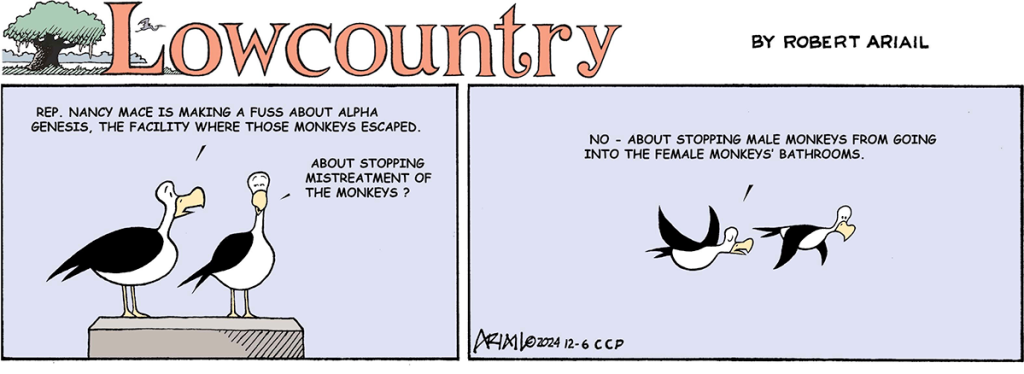
Nationally award-winning cartoonist Robert Ariail always has an interesting take. This week, he takes a look at how U.S. Rep. Nancy Mace is making a fuss over bathrooms and monkeys.
- What do you think … love it or hate it? Did he go too far, or not far enough? Send your thoughts to feedback@statehousereport.com.
The state program lots of people love
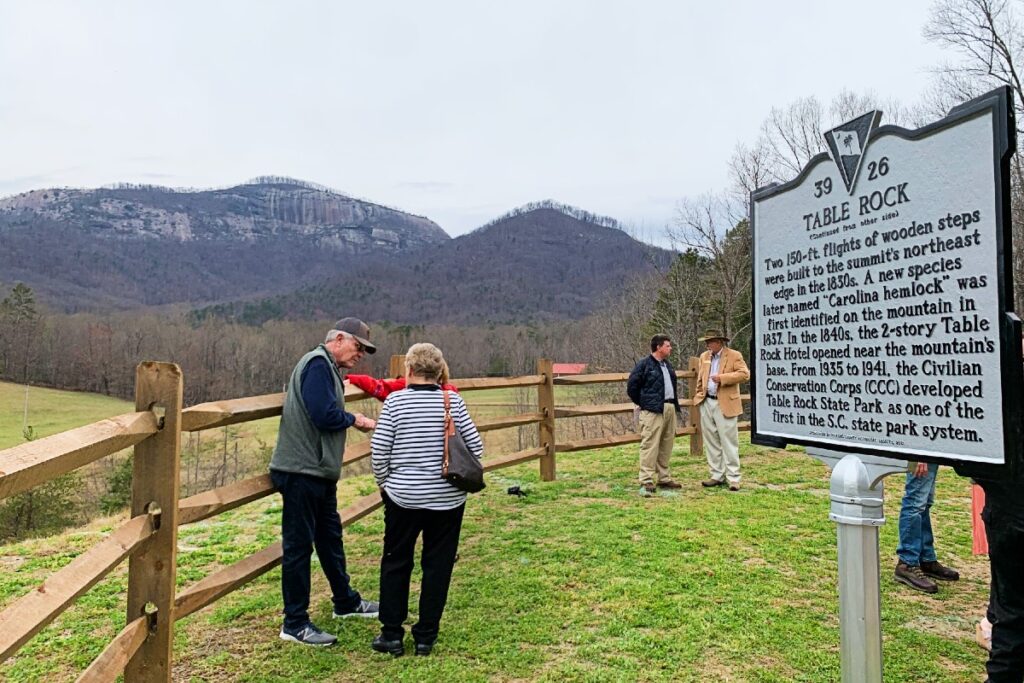
Commentary by Andy Brack | Take this column as a sign of things that are here.
 The S.C. Department of Archives and History on Dec. 5 unveiled a new exhibit in Columbia about those historical markers – signs – you see dotted across South Carolina’s landscape. The exhibit celebrates the state’s collection of 2,000 markers spread high and low – from Table Rock to the Temple of Sport in the Lowcountry.
The S.C. Department of Archives and History on Dec. 5 unveiled a new exhibit in Columbia about those historical markers – signs – you see dotted across South Carolina’s landscape. The exhibit celebrates the state’s collection of 2,000 markers spread high and low – from Table Rock to the Temple of Sport in the Lowcountry.
Eric Emerson, the agency’s director, said he’s constantly amazed at how much people enjoy the historic markers.
“In this age where everything is digital and apps and online and people want to access history digitally, that there is something tangible and out there in the public still generates interest among South Carolinians,” he said. “People love the program.”
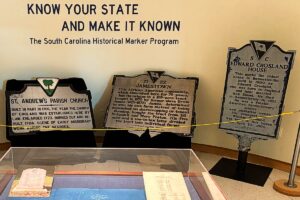
Edwin Breeden, who coordinated the exhibit and helps to verify what’s on new markers, said the state’s marker program allows the department to partner with local groups to shine a spotlight on history and its relevance now.
“It makes people more aware of the ways that history is not just something that unfolds in other places,” he said. “It’s something that has real connections to places across the state.”
Back in 1936, the department, then called the S.C. State Historic Preservation Office, established the official state historical marker program. It’s one of the oldest programs of its type and, interestingly, isn’t filled with a bunch of hurdles. If a group wants a marker, it needs to do research, come up with wording, apply and be able to pay the $2,500 to $3,000 for the aluminum marker. But before the department gives its seal of approval, it verifies the information and ensures the proposal has local, state or national historic significance.
“We also usually do a lot of additional research,” Breeden said. “But it’s a fairly straightforward process.”
In an average year, the program approves 50 new markers. Here’s a look at some interesting ones:
 First marker: Long Canes Massacre, Greenwood County. The program’s first marker actually commemorates a 1760 Cherokee attack on 23 settlers in McCormick County, but is physically located just over the county line.
First marker: Long Canes Massacre, Greenwood County. The program’s first marker actually commemorates a 1760 Cherokee attack on 23 settlers in McCormick County, but is physically located just over the county line.
2,000th marker: Finley High School, Chester. The marker, unveiled in October, recognizes a 1950s-era equalization school erected during the state’s civil rights struggles. Alumni sponsored it. Gov. Henry McMaster, a big fan of the marker program, spoke at its dedication.
A favorite marker: Table Rock in Pickens County. “That was a really fascinating project to work on because it was for a natural feature,” Breeden said. “It was kind of challenging to tell the history that wasn’t just reciting geological facts.” It includes the social and cultural history of the mountain and how it became an icon for the state.
Reminder markers. Emerson said he is fascinated with markers in places that people wouldn’t know had history unless the markers were there. Examples are signs that denote Cherokee townships that have no trace today. Or a 2008 marker near Charleston International Airport that highlights the importance of a 1790s garden by French botanist Andre Michaux who imported plants that were tremendously important to American agriculture.
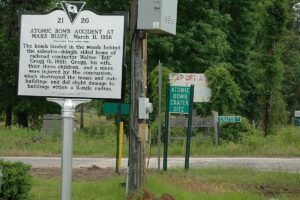 Odd marker: Mars Bluff atomic bomb accident, Florence County. In 1958, a U.S. Air Force jet with a nuclear payload accidentally dropped an unarmed bomb used for a nuclear payload. While the warhead was not installed, the bomb’s high explosives detonated on impact, leaving a huge crater and destroying a house. “It’s an unusual story that a lot of people aren’t aware of,” Breeden said. Emerson agreed.
Odd marker: Mars Bluff atomic bomb accident, Florence County. In 1958, a U.S. Air Force jet with a nuclear payload accidentally dropped an unarmed bomb used for a nuclear payload. While the warhead was not installed, the bomb’s high explosives detonated on impact, leaving a huge crater and destroying a house. “It’s an unusual story that a lot of people aren’t aware of,” Breeden said. Emerson agreed.
- To see the agency’s new free exhibit on markers, visit the department Monday through Friday from 8:30 a.m. to 5 p.m. Location: 8301 Parklane Rd., Columbia, S.C. 29233. The exhibit is open through March.
Andy Brack is editor and publisher of Statehouse Report and the Charleston City Paper. Have a comment? Send to: feedback@charlestoncitypaper.com.
The Felkel Group
 The public spiritedness of our underwriters allows us to bring Statehouse Report to you at no cost. This week in the underwriter spotlight is The Felkel Group, a battle-tested public affairs and business development firm that assists corporations, associations and not-for-profits that are serious about their long-term success. The Felkel Group solves problems, crafts and delivers messages, helps organizations to manage crisis, and uses a wealth and breadth of valuable relationships to help to seal deals.
The public spiritedness of our underwriters allows us to bring Statehouse Report to you at no cost. This week in the underwriter spotlight is The Felkel Group, a battle-tested public affairs and business development firm that assists corporations, associations and not-for-profits that are serious about their long-term success. The Felkel Group solves problems, crafts and delivers messages, helps organizations to manage crisis, and uses a wealth and breadth of valuable relationships to help to seal deals.
The Felkel Group is also home to an outstanding advocacy tool called The Rap Index, a powerful intelligence tool that employs sophisticated computer modeling and profiling techniques to help organizations find their most effective advocates. To learn more about The Felkel Group and its Rap Index, go to: http://www.felkelgroup.com.
Australia is tackling a major social problem

Commentary by Elliott Brack | Most people deplore the constant use of cell phones by children (and some adults), thinking that this is harming them, and keeping them away from better activity. But what to do about this growing problem?
 No one yet has come up with the solution to this question.
No one yet has come up with the solution to this question.
But one country has recently taken a step in that direction.
The Australian government is taking on this problem. That government is not aiming at the users involved, mainly the kids, but focusing its attention on the companies operating these platforms! What a novel approach, to focus on the industry itself!
The whole idea is to protect the mental health and well-being of children from the detrimental effects of social media. Cited among the problems that the children face are online hate and bullying.
It’s how the government will go about this that is innovative. The Australian government wants the social media companies themselves to find ways to prevent those under age 16 from having an account to access these platforms.
But notice that it is up to the companies providing the platforms, and making money from the operation of these platforms, that the Australian government is focusing on.
“You make the money from this, you fix the problem,” the government is saying.
Recognize that the Australians are not telling the platform companies how to do this. These companies are smart enough to find a solution, the government feels, so let them have at it in order to protect the well-being of younger children.
Also note that the children and the parents in Australia will not face any punishment if they use social media. While you suspect that children will find some ways to get around this new restriction, the focus remains on the platform providers.
Will this work? Who can tell? However, Australia is a country of 26 million people, about twice the population of Georgia with 11 million people. Australia is small enough so that if it can find a way around this problem, they will have done yeoman service to show the rest of the world one way to attack this situation.
In the rest of the world, the computer age and social media have exploded and surprised people with its far-reaching power. This new way to communicate is a mighty force…..but not necessarily always for good.
The world is just recognizing some of the pitfalls and advantages of this new age of communicating to one another. Up to now, there has not been much governmental effort of control of this phenomenon. But the world is recognizing that this new method needs some form of regulation.
Also don’t overlook the political nature of this communicating. Today modern warfare is not in trenches and aerial assaults, but in nations trying to influence politics in other countries through these platforms.
The Australians are showing us one way to tackle the problems caused by social media. It’s up to these platform companies to make sure their work is being done for the overall common good.
Thank you, Australia.
Longtime Georgia newspaperman Elliott Brack is editor and publisher of GwinnettForum.com.
Home on the range
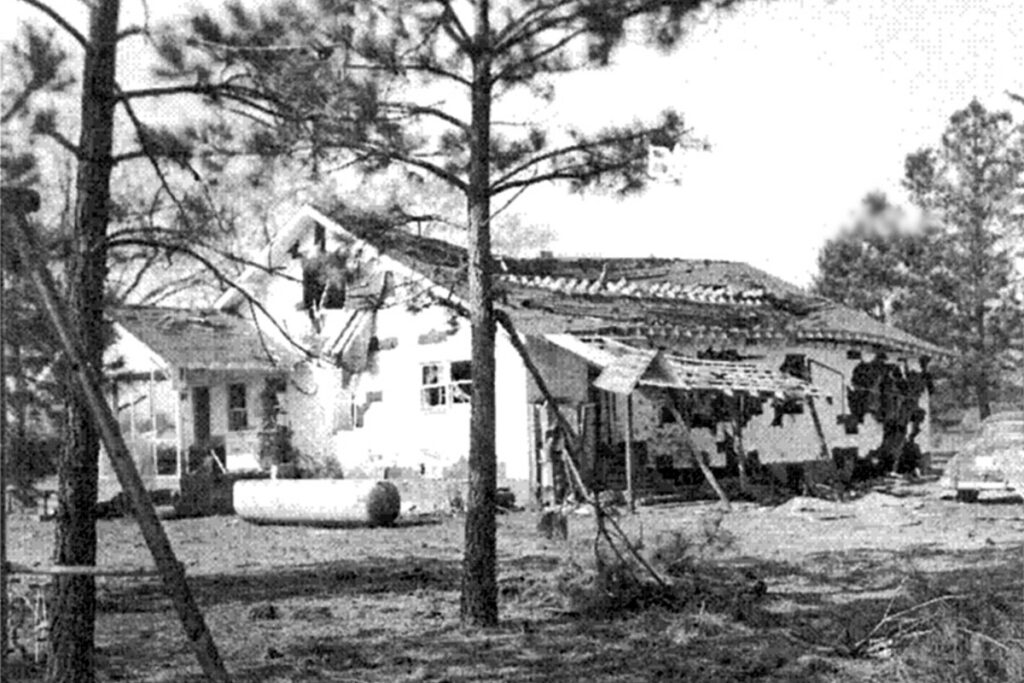
Here’s an interesting old picture. What makes it interesting? Send your name, hometown and guess to: feedback@statehousereport.com.
 We didn’t run a mystery photo last week. But the mystery from Nov. 22’s issue, “Water scene,” showed a mural on East Bay Street in Charleston.
We didn’t run a mystery photo last week. But the mystery from Nov. 22’s issue, “Water scene,” showed a mural on East Bay Street in Charleston.
Jay Altman of Columbia observed that the mural, by artist David Boatsright, depicts “rising water levels in Charleston.” Boatwright and others are working to preserve the deteriorating mural installed outside 10 years ago.
Others who correctly identified the artwork were Allan Peel of San Antonio, Texas; David Lupo of Mount Pleasant; Nancy Barksdale, Vicki Ringer and Elizabeth Jones, all of Columbia; Bill Segars of Hartsville; George Graf of Palmyra, Va.; and Pat Keadle of Perry.
- Send us a mystery picture. If you have a photo that you believe will stump readers, send it along (but make sure to tell us what it is because it may stump us too!) Send to: feedback@statehousereport.com and mark it as a photo submission. Thanks.
Statehouse agenda missing a couple of things
To the editor:
![]() Re: Statehouse GOP agenda focuses on tax cuts, vouchers (11/15/24)
Re: Statehouse GOP agenda focuses on tax cuts, vouchers (11/15/24)
Infrastructure, liquor liability and lowering income taxes is a positive.
DEI oversight is a waste of time and a loss cause for progressives in the state. Republicans pursuing it is mean-spirited and spiteful. Declare victory and let it go.
School vouchers, with the change in the state Supreme Court will surely pass with some additional legalese and a different court. I read the recent ruling, well-written and a lesson in civics as it documents the longstanding disdain for public education. The one thing I would like to see is the public to be made aware of the Catholic Diocese of Charleston’s participation in the lawsuit. This would result in direct support for an organization that had to spend millions of dollars to settle child sexual abuse lawsuits.
The only legislative action on abortion should be to approve putting the question on the ballot to determine the “will of the people.”
Missing on the Republican agenda is addressing the financial accounting and reporting control which seems to have dropped off the radar scheme. I guess they’re still looking at the “found” $1.8 billion. Republican leadership reaction indicates either indifference or incompetence.
– George Swindell, Greenwood, S.C.
Send us your thoughts
We encourage you to send in your thoughts about policy and politics impacting South Carolina. We’ve gotten some letters in the last few weeks – some positive, others nasty. We print non-defamatory comments, but unless you provide your contact information – name and hometown, plus a phone number used only by us for verification – we can’t publish your thoughts.
-
- Have a comment? Send your letters or comments to: feedback@statehousereport.com. Make sure to provide your contact details (name, hometown and phone number for verification. Letters are limited to 150 words.
-
- Send us a mystery picture. If you have a photo that you believe will stump readers, send it along (but make sure to tell us what it is because it may stump us too!) Send to: feedback@statehousereport.com and mark it as a photo submission. Thanks.
ABOUT STATEHOUSE REPORT
Statehouse Report, founded in 2001 as a weekly legislative forecast that informs readers about what is going to happen in South Carolina politics and policy, is provided to you at no charge every Friday.
- Editor and publisher: Andy Brack, 843.670.3996
- Statehouse bureau chief: Jack O’Toole
Donate today
We’re proud to offer Statehouse Report for free. For more than a dozen years, we’ve been the go-to place for insightful independent policy and political news and views in the Palmetto State. And we love it as much as you do.
But now, we can use your help. If you’ve been thinking of contributing to Statehouse Report over the years, now would be a great time to contribute as we deal with the crisis. In advance, thank you.
More
- Mailing address: Send inquiries by mail to: P.O. Box 21942, Charleston, SC 29413
- Subscriptions are free: Click to subscribe.
- We hope you’ll keep receiving the great news and information from Statehouse Report, but if you need to unsubscribe, go to the bottom of the weekly email issue and follow the instructions.
- Read our sister publication: Charleston City Paper (every Friday in print; Every day online)
- © 2024, Statehouse Report, a publication of City Paper Publishing, LLC. All rights reserved.















 We Can Do Better, South Carolina!
We Can Do Better, South Carolina!